
So many times, people overthink their workouts. Are you burning the most calories? Maximizing your muscle-building efforts? Don't stress over what type of exercise is best. Just ask yourself: What type of exercise am I most likely to do consistently?
Too many people get caught up in the specifics, feel overwhelmed and stop soon after they've started. Here's a solution: Use a jump rope. Jumping rope is as much therapy as it is exercise. And because it's exercise, it can help reduce anxiety, depression and stress. All you need for your quick, 20-minute workout from personal trainer Lance Goyke is a jump rope you can bring with you anywhere.
Video of the Day
Video of the Day
Do: the first two exercises as a warm-up, then do moves 3 through 9 as a circuit, repeating for a total of two to three rounds (depending on how quickly you get through them). Finish up with the final two exercises as your cooldown.
Check out more of our 20-minute workouts here — we’ve got something for everyone.
1. Alternate Leg Hops
- Start bouncing from one foot to another (left, right, left, right) without a rope.
- If this isn't intense enough for you, take an extra hop on one foot before switching to the other side (left, left, right, right).
- Play around with what feels right. If you need more of a challenge, pick up the pace.
Reps: 100 per side
Tip
Start with an easy warm-up that elevates your heart rate and prepares your mind and body for exercise. If you aren’t very experienced with a jump rope, listen to some music and bounce to the beat, Goyke says. Jumping rope is all about timing, and this is a great way to practice.
2. Cross-Body Rope Circles
Even though jumping rope places a heavy emphasis on the lower body, you still need to warm up your upper body. To fire up your shoulder muscles, use a spinning jump rope as a rhythmic, dynamic weight to control, Goyke says.
- Hold both handles of the jump rope in your right hand. Holding the rope out to your right side, start making circles with the rope.
- Once you have a rhythm, cross your arm in front of your body to make a circle on the other side.
- Eventually, your right hand will be making circles on alternating sides of your body (right, left, right, left).
Reps: 50 on the right, then 50 on the left
3. Simple Jump Rope
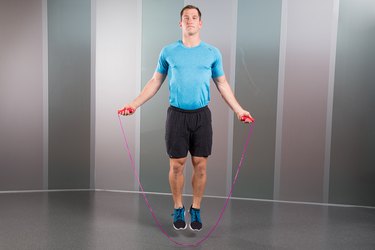
It's time to combine the three things you practiced in your warm-up: lower-body movement, upper-body movement and rhythm. Incorporating different areas of the body not only burns more calories, it also uses more of your brain, giving you a mental challenge as well, Goyke says.
- Start with the rope behind you.
- Swing it up over your head and bring it back down to your feet.
- Jump before it hits your feet and repeat.
Reps: 25 (or 50 for a challenge)
Tip
If you’re inexperienced with jumping rope, you’ll probably notice initially that your timing is way off and you hit your feet a lot. That’s OK! Everyone has to start somewhere, and you'll get the hang of it as you practice more, Goyke says.
4. High-Knee Jumps
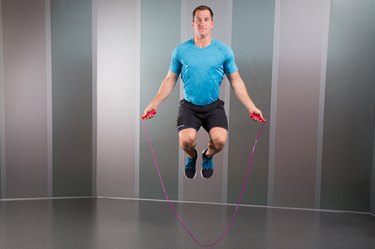
Now it's time to up the intensity. The best thing about this workout is that you're using your own body weight to provide the resistance and make it more difficult. So instead of just hopping, you'll also pull up your legs.
- Build up steam with a few simple rope jumps, then transition into high-knee rope jumps.
- On every jump, bring your knees up as high as you can.
- Once you get the hang of it, push yourself even harder and bring your knees up higher.
Reps: 25 (or 50 for a challenge)
5. Leg Lowering
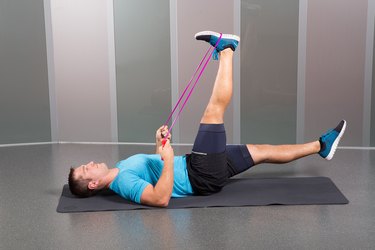
- Lie on your back with the jump rope still in your hands. Keeping your legs straight, raise your legs so they're perpendicular to the ground. If you can't get them that high, that's OK.
- Wrap the rope around your left foot and use the rope to help hold that foot in the air.
- Lower your right leg to just above the ground.
- Raise it back to perpendicular.
- Do all reps on one leg before switching sides.
Reps: 10 on each side
Tip
Plant your back firmly on the ground the entire time. If you lower your leg and feel your back come off the ground, don’t go down as far on the next rep, Goyke says. Also think about keeping your legs “long” all the way through your heels throughout the exercise.
6. Scissor Jumps
These are very similar to the simple jumps, but your foot position changes — one leg forward, one leg back. Scissor jumps are a more dynamic way of training the same movement pattern as the leg lowering you just did, and they also teach you to move from side to side, Goyke says.
- Jump and land with one foot forward and the other foot back on each jump.
- Alternate sides, and maintain your rhythm.
Reps: 25 (or 50 for a challenge)
7. Skipping Jumps
Moving from two legs to one leg challenges muscular strength and balance in a way that you haven't yet done in this workout, Goyke says. To ease into single-leg training, start off by skipping.
- Keep the same tempo as you had with the scissor jumps, but land with only one foot on the ground.
- When the rope comes around, jump up with your right leg and land on your left.
- Perform a little hop on your left leg while the rope is behind you.
- When the rope comes back around, jump up with your left leg and land on your right leg. Think about skipping as you spin the rope over and under.
Reps: 25 (50 for a challenge)
8. Alternating Single-Leg Jumps
Alternating single-leg rope jumps are more intense than the skipping jumps because now the rope has to move faster to keep up with your jumps because you don't have the benefit of the extra hop when skipping, Goyke says.
- Jump with the right leg as the rope comes under your feet.
- Land on your left leg, then jump with the left as the rope comes back around. The cadence is right, rope, left, rope.
Reps: 25 (or 50 for a challenge)
9. Single-Leg Jumps
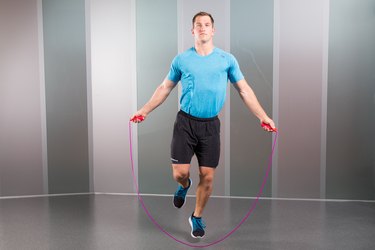
This exercise removes the movement from side to side on each rep, eliminating the rest period you normally get on the previous two exercises. Having to jump and land on one leg requires a lot of power, strength, balance and coordination (especially when there's a rope flying around your body), Goyke says.
- Jump and land with the same leg each time the rope comes around.
- The cadence is left, rope, left, rope, until you've completed all the reps in one set.
Reps: 2 sets of 5 on each leg (or 10 for a challenge)
10. Supine 3-Month Diagonals
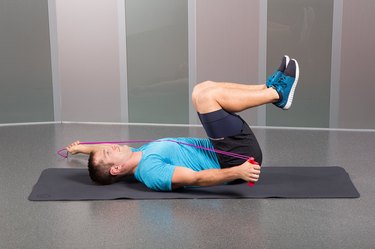
- Grab an end of your jump rope in each hand and lie on your back. Bring your feet up in the air with your legs bent and reach your hands towards the sky. Exhale slowly and press your back into the ground.
- Bring your hands toward the ground to make a diagonal with the jump rope across your body. Your right palm should be facing the ground next to your right hip. Your left hand should be overhead and out to the side with your thumb poking into the ground.
- Set your hands apart on the rope so that it stops you just before your hands reach the ground.
- Hold this position and take five breaths before switching sides.
Reps: 2 sets of 5-breath holds
11. Split-Squat Hold
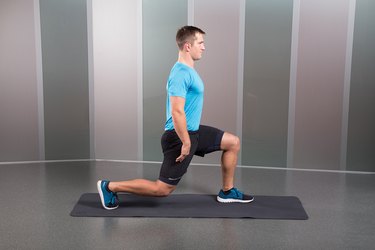
- Kneel down on one knee with both knees bent at 90 degrees. Exhale fully to set your ribs down and tuck your tailbone beneath you.
- Holding this position, bring your lower knee up just above the ground.
- Stay still for as long as you can with your knee hovering just above the ground.
- When you feel like you can't hold the position any longer, hold it for 10 more seconds before switching sides.
Reps: once on each leg